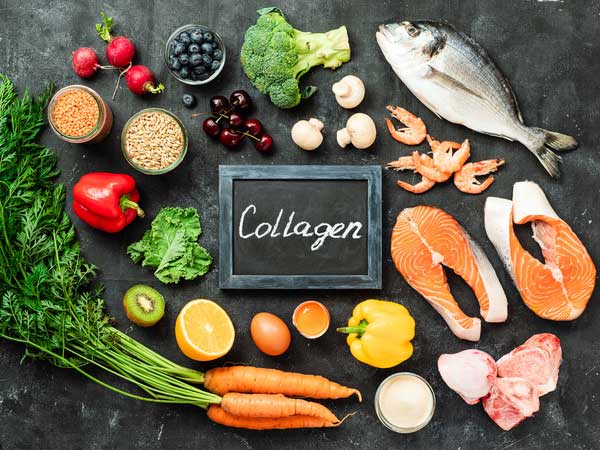Collagen is the protein responsible for skin elasticity, bone and muscle integrity. As we age, collagen production declines which can lead to sagging skin and joint issues. While collagen supplements are popular, good nutrition can also considerably boost your body’s collagen production and help achieve more skin elasticity and a younger looking skin. In this article, we’ll discuss 12 healthy collagen-boosting foods.

Chicken
Chicken is a lean meat rich in protein and essential amino acids that help boost collagen production and support skin, joints and bone health. Chicken contains about 30 different nutritional compounds per 100 grams. One cup of chicken meat has around 38 grams of protein. Chicken provides quality protein and amino acids needed for collagen synthesis.
Beef
Beef is delicious, nutritious and versatile. It’s especially rich in protein, iron, B vitamins, zinc, selenium and phosphorus. The protein in beef provides amino acids needed to produce collagen. As you age, eat more collagen-boosting foods like beef for skin, bone and joint health. The optimal beef serving is about 3 ounces, the size of your palm.
Fish
Fish like salmon, tuna, mackerel and sardines are excellent collagen sources. Fish is highly nutritious, rich in omega-3s, protein, selenium, B vitamins and antioxidants. Certain collagen supplements are even made from fish skin. Eat more fish in your diet by sautéing, baking or grilling. The protein in fish provides amino acids for collagen production.
Beans
Beans are an excellent plant-based source of protein, fiber, B vitamins and more. Beans provide essential amino acids for collagen production that your body needs. Pick your favorite beans and add them to meals like chili, stews, soups or make a bean dip.
Eggs
Eggs are a protein powerhouse with essential amino acids for collagen. Eat both the egg whites and yolks to get nutrients needed for collagen synthesis. The egg whites contain proline, an essential amino acid for collagen. Add eggs along with veggies for an extra collagen boost.
Dairy
Dairy products like milk, cheese and yogurt contain a lot of protein that contributes to collagen production. They also provide nutrients like calcium and vitamin D. However, those with lactose intolerance or dairy allergies should avoid them.
Bone Broth
Bone broth is made by boiling animal bones and contains nutrients that may help absorb more collagen. Bone broth has calcium, potassium, magnesium, phosphorus and more from the bones. It also contains nutrients from bone marrow and cartilage that support health. Drink bone broth plain or use it to flavor stews.
Berries
Berries like blueberries and strawberries have antioxidants and vitamin C for collagen production. Their anthocyanins and flavonoids also have anti-inflammatory benefits. Add fresh or frozen berries to oatmeal, yogurt, cereal or eat as a snack.
Oysters
Oysters are excellent sources of zinc and copper, two minerals essential for collagen production. Buy canned or frozen oysters for quick collagen-boosting meals. Mix oysters with your favorite spices for a nutritious dinner.
Dark Leafy Greens
Dark leafy greens like kale, spinach and bok choy are high in vitamin C and nutrients for collagen production. Greens support collagen synthesis, so eat them daily. Try greens like dandelion, arugula, chard, kale, broccoli and more.
Citrus Fruits
Citrus fruits are packed with vitamin C, which is required for collagen synthesis. Eat citrus fruits whole, juice them or add to water, salads, smoothies. Good options are orange, grapefruit, lemon and lime.
Chickpeas
Chickpeas contain protein, vitamin C and zinc for collagen production. Enjoy chickpeas as hummus, in soup or stew, or roast them with olive oil and spices. Dip vitamin C rich veggies in hummus for a collagen boost.
Maintain a Collagen-Boosting Lifestyle
Along with eating collagen-boosting foods, protect your skin from excessive sun, stay hydrated, avoid smoking, and manage stress. Taking collagen supplements can provide an extra boost as you age. Focusing on whole foods over processed items will enhance collagen synthesis for youthful skin as you get older.
Conclusion
To boost collagen, focus on foods with proline, vitamin C, copper, protein, vitamin A and amino acids. Limit sugar, sun exposure and smoking. Following a balanced diet with these collagen-boosting foods can support skin health, elasticity and your overall wellbeing.
Do check out another post: 10 Food to increase collagen naturally
